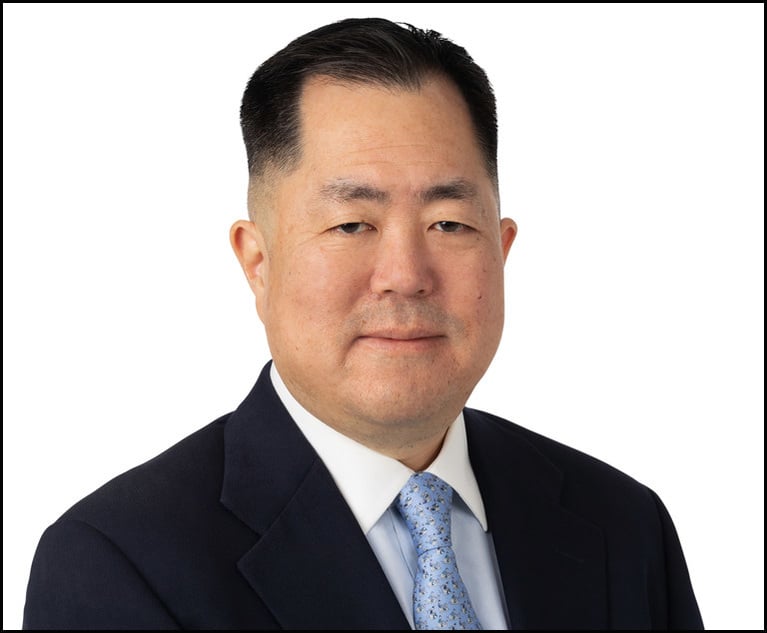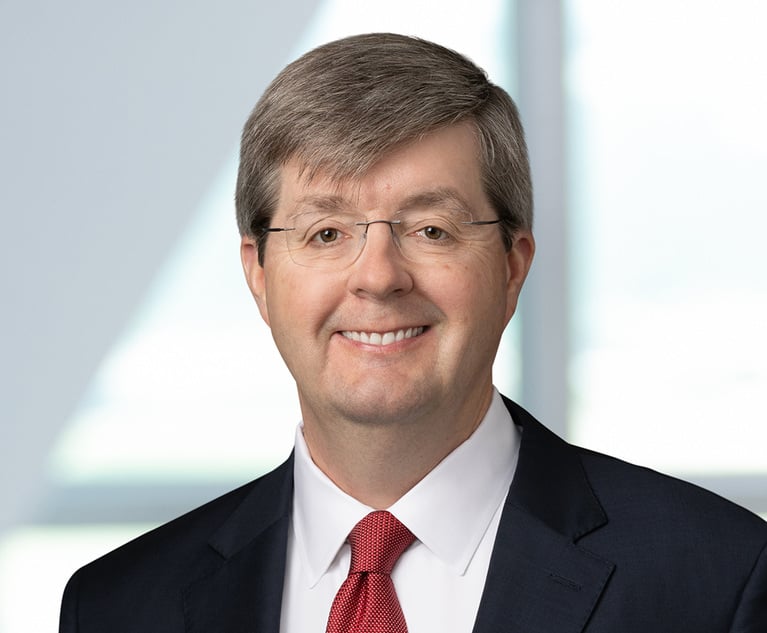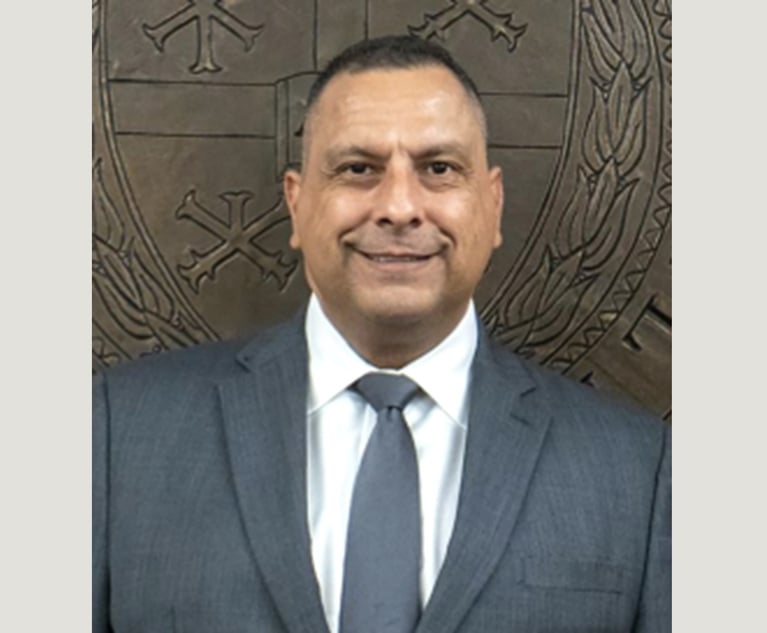 (Courtesy photo)
(Courtesy photo)Cozen O'Connor Sees Revenue Outpace Profit Growth in Investment Year
The firm boosted revenue by nearly 14 percent in 2018, but profits rose more modestly amid spending on technology and talent.
February 21, 2019 at 10:23 AM
4 minute read
The original version of this story was published on The Legal Intelligencer
Cozen O'Connor posted strong revenue gains again in 2018, though profit growth slowed as the firm spent on lateral hires and tech upgrades.
Gross revenue at the Philadelphia-based Am Law 100 firm increased 13.7 percent, reaching $473 million. Revenue per lawyer grew 4.4 percent, to $711,000.
“It was another terrific year for the firm,” said CEO Michael Heller. “We also had a big investment year where we continued to invest in people and technology.”
Profits per equity partner showed more incremental gains, rising 2.6 percent to $828,000 as the equity partnership grew. Net income was up 6.2 percent, to $152.8 million.
The firm raised rates by about 3 percent, Heller said.
 Standout performance, Heller said, came from the state attorneys general practice and a life insurance and annuity practice group the firm added this year, as well as the subrogation, corporate, real estate and labor and employment groups.
Standout performance, Heller said, came from the state attorneys general practice and a life insurance and annuity practice group the firm added this year, as well as the subrogation, corporate, real estate and labor and employment groups.
Cozen O'Connor's ancillary businesses, which include a lobbying arm and a campus safety consultancy, contributed about 6 percent of the firm's revenue, Heller said.
In terms of significant matters, he said, Cozen O'Connor was lead counsel for Wells Fargo Bank in a $575 million resolution with attorneys general in all 50 states over consumer claims. The firm also represented cannabis company Acreage Holdings Inc. in its corporate transactions, including a $160 million acquisition of cannabis manufacturer Form Factory Inc. And on the litigation side, it was among the firms that represented Arista Networks Inc. in an antitrust action against Cisco Systems Inc., which settled in August for $400 million.
The firm continued to grow its head count, adding a net 54 lawyers throughout the year, to reach 665. The equity partnership grew by seven partners to 185, while the nonequity partner tier grew by 9.1 percent, to 155 lawyers.
Cozen O'Connor's lateral additions in 2018 included 14 commercial litigators in Philadelphia who made a move from Drinker Biddle & Reath in April, bringing with them a practice focused on life insurance and annuities. The firm also brought on a pair of IP partners in the Pacific Northwest, and continued to add to its labor and employment practice.
Still, “it was a slower year for group acquisitions,” Heller said, compared to a 2017 in which the firm added about 100 lateral hires. In 2018, there was a greater focus on integrating those lawyers, he said.
That included building out office space to fit the firm's growth, he said—requiring large construction projects in four cities and smaller projects in many of the other offices. That was one of the significant one-time expenses Cozen O'Connor experienced last year, Heller said.
“We always try to manage the firm expenses on a conservative basis, but we have never taken the approach that you can cut your way to prosperity,” Heller said. The firm is open to opportunities that may result in greater expenses, he said, “if they will drive revenue.”
Cozen O'Connor also provided new devices to all attorneys in 2018 and upgraded the operating systems on those devices, Heller added. Cybersecurity protocols continued to expand, he said, but that cost was no more meaningful than in previous years.
Also in the technology category, Heller said, “we continue to spend a lot of money on data analytics … improving our technology for purposes of evaluating profitability, and efficiency, and pricing.”
The firm saw a significant improvement in realization in 2017, which remained steady in 2018, he said, and he hopes to see more benefits of the analytics push in the next two to three years.
Looking to the future, Heller said Cozen O'Connor is aiming to further grow its ancillary businesses, with a goal of having 10 percent of revenue accounted for by those businesses. To that end, it's planning to officially launch a family office business this year, which will work together with the law firm's private client practice.
Heller said the firm is not expecting to slow its growth, even if the economy slows in the next two years. However, he noted, “We are always keeping an eye on making sure we are right-sized for all eventualities.”
“It's not a coincidence that we've been making big investments in the past three to five years,” Heller said.
This content has been archived. It is available through our partners, LexisNexis® and Bloomberg Law.
To view this content, please continue to their sites.
Not a Lexis Subscriber?
Subscribe Now
Not a Bloomberg Law Subscriber?
Subscribe Now
NOT FOR REPRINT
© 2025 ALM Global, LLC, All Rights Reserved. Request academic re-use from www.copyright.com. All other uses, submit a request to [email protected]. For more information visit Asset & Logo Licensing.
You Might Like
View All
Husch Blackwell Hires Former Adobe Counsel to Oversee AI Advisory Offering
3 minute read
'Taking the Best' of Both Firms, Ballard Spahr and Lane Powell Officially Merge
6 minute read
Bracewell Adds Former Pioneer Natural Resources Lawyer to O&G, Energy Transition Practices
2 minute read
Trending Stories
- 1The Appropriate Exemption in Students for Fair Admissions v. President & Fellows of Harvard College
- 2DOJ, 10 State AGs File Amended Antitrust Complaint Against RealPage and Big Landlords
- 3New Partners at Cummings & Lockwood, Carmody Torrance Sandak & Hennessey
- 4'Extra Government'?: NY Top Court Eyes Ethics Commission's Constitutionality
- 5South Texas College of Law Houston Selects New Dean
Who Got The Work
Michael G. Bongiorno, Andrew Scott Dulberg and Elizabeth E. Driscoll from Wilmer Cutler Pickering Hale and Dorr have stepped in to represent Symbotic Inc., an A.I.-enabled technology platform that focuses on increasing supply chain efficiency, and other defendants in a pending shareholder derivative lawsuit. The case, filed Oct. 2 in Massachusetts District Court by the Brown Law Firm on behalf of Stephen Austen, accuses certain officers and directors of misleading investors in regard to Symbotic's potential for margin growth by failing to disclose that the company was not equipped to timely deploy its systems or manage expenses through project delays. The case, assigned to U.S. District Judge Nathaniel M. Gorton, is 1:24-cv-12522, Austen v. Cohen et al.
Who Got The Work
Edmund Polubinski and Marie Killmond of Davis Polk & Wardwell have entered appearances for data platform software development company MongoDB and other defendants in a pending shareholder derivative lawsuit. The action, filed Oct. 7 in New York Southern District Court by the Brown Law Firm, accuses the company's directors and/or officers of falsely expressing confidence in the company’s restructuring of its sales incentive plan and downplaying the severity of decreases in its upfront commitments. The case is 1:24-cv-07594, Roy v. Ittycheria et al.
Who Got The Work
Amy O. Bruchs and Kurt F. Ellison of Michael Best & Friedrich have entered appearances for Epic Systems Corp. in a pending employment discrimination lawsuit. The suit was filed Sept. 7 in Wisconsin Western District Court by Levine Eisberner LLC and Siri & Glimstad on behalf of a project manager who claims that he was wrongfully terminated after applying for a religious exemption to the defendant's COVID-19 vaccine mandate. The case, assigned to U.S. Magistrate Judge Anita Marie Boor, is 3:24-cv-00630, Secker, Nathan v. Epic Systems Corporation.
Who Got The Work
David X. Sullivan, Thomas J. Finn and Gregory A. Hall from McCarter & English have entered appearances for Sunrun Installation Services in a pending civil rights lawsuit. The complaint was filed Sept. 4 in Connecticut District Court by attorney Robert M. Berke on behalf of former employee George Edward Steins, who was arrested and charged with employing an unregistered home improvement salesperson. The complaint alleges that had Sunrun informed the Connecticut Department of Consumer Protection that the plaintiff's employment had ended in 2017 and that he no longer held Sunrun's home improvement contractor license, he would not have been hit with charges, which were dismissed in May 2024. The case, assigned to U.S. District Judge Jeffrey A. Meyer, is 3:24-cv-01423, Steins v. Sunrun, Inc. et al.
Who Got The Work
Greenberg Traurig shareholder Joshua L. Raskin has entered an appearance for boohoo.com UK Ltd. in a pending patent infringement lawsuit. The suit, filed Sept. 3 in Texas Eastern District Court by Rozier Hardt McDonough on behalf of Alto Dynamics, asserts five patents related to an online shopping platform. The case, assigned to U.S. District Judge Rodney Gilstrap, is 2:24-cv-00719, Alto Dynamics, LLC v. boohoo.com UK Limited.
Featured Firms
Law Offices of Gary Martin Hays & Associates, P.C.
(470) 294-1674
Law Offices of Mark E. Salomone
(857) 444-6468
Smith & Hassler
(713) 739-1250








